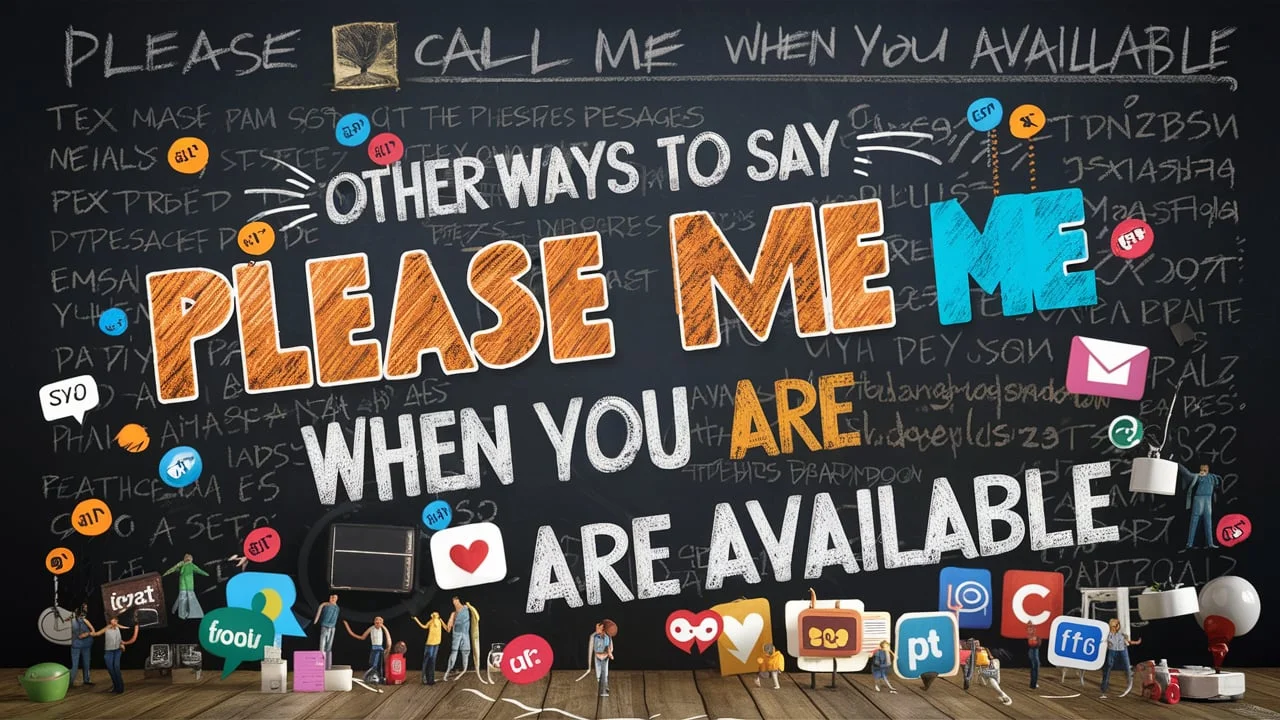When communicating professionally or personally, it’s important to express yourself clearly and politely. The phrase “Please call me when you are available” is commonly used, but there are various ways to convey the same sentiment while making your communication sound more natural, respectful, or tailored to the context. In this article, we will explore several alternatives to this commonly used phrase. Whether you’re writing an email, leaving a voicemail, or sending a text, diversifying your language can make your communication more effective and engaging. Other Ways to Say “Please Call Me When You Are Available”.
Each alternative we’ll discuss here comes with its own nuances, so you can pick the one that best fits your relationship with the person you’re addressing and the context in which you’re speaking. The goal is to ensure you express your need for a call or conversation while maintaining professionalism or a friendly tone, depending on the situation.
Read More: Other Ways to Say “I Have Forwarded Your Email”
Suggesting Flexibility in Communication
If you’re looking to make the request more flexible, you can say, “Let me know when you’re free to chat.” This alternative conveys the same idea but with a slightly less formal tone. By saying “let me know,” you’re leaving the ball in the other person’s court, giving them the opportunity to choose a time that works best for them. This approach works well in both professional and personal contexts, as it acknowledges the recipient’s busy schedule and leaves room for them to respond when they can. Additionally, this phrase sounds less demanding, allowing the other person to feel less pressured while still addressing the need for a conversation. Using this variation can help establish a more comfortable tone while still showing your eagerness to connect.
Offering a Specific Window of Time
A more specific approach might be saying, “I’d appreciate it if you could call me within the next few hours.” This gives the person an idea of when you’d like to hear from them, without being overly strict. It’s ideal for situations where timing is somewhat important, but you’re still allowing for a little leeway. This variation helps set expectations for a call or response, giving the other person a clear window of time to fit the call into their schedule. At the same time, it remains polite and professional, making it suitable for workplace settings, as well as more casual conversations where timing is still somewhat crucial. It subtly implies urgency but without being pushy or demanding, keeping the interaction balanced.
Inviting the Other Person to Choose the Best Time
Another polite and considerate variation is: “Feel free to call me at your convenience.” This phrase is often used in business contexts when trying to accommodate the other person’s schedule. By using “at your convenience,” you’re expressing that you are open to receiving a call at a time that works best for them, and that you respect their time and availability. This approach can be particularly useful in customer service interactions, client relations, or professional environments, where flexibility is often valued. It’s a courteous way to let the recipient know you’re not in a rush and are happy to work around their availability, fostering a cooperative and positive tone in your communication.
Respecting Their Time
A great way to phrase the request while respecting their schedule is: “I understand you may be busy, but please do let me know when you can give me a call.” This version acknowledges that the other person may have a packed schedule, which shows consideration for their time. By stating, “please do let me know,” you’re not only requesting a call but also signaling that you value their availability and are willing to wait for the right moment. This alternative is ideal for situations where you don’t want to seem too insistent but still want to convey your need for a conversation. It strikes a nice balance between courtesy and directness.
Keeping It Casual and Friendly
If you’re looking to keep things casual and friendly, you could say, “Give me a ring whenever you’re free!” This approach is informal and works well in personal settings. It has a relaxed tone and invites the other person to call you when it’s convenient for them, without sounding too formal or stiff. While this might not be the best choice in a professional or formal setting, it’s ideal for friends or family members with whom you have a more laid-back relationship. The use of “whenever” gives a sense of flexibility, making it clear that you’re not demanding a call at a specific time but are simply open to it.
Suggesting a Follow-Up Call
Another polite variation would be: “Can we touch base when you have a moment?” This phrase suggests a brief check-in and implies that the call doesn’t need to be lengthy. It is particularly useful when you just want to catch up with the other person or get a quick update. The phrase “when you have a moment” also emphasizes that you’re respectful of their time and schedule. It is a versatile alternative that can be used in both professional and personal contexts, from workplace communications to friendly reminders. This version is ideal when you don’t need an immediate call but want to express the importance of connecting soon.
Using a More Direct Approach
If you need the call sooner, you might say, “Please get in touch with me when you have a break.” This variation is slightly more direct and expresses a greater sense of urgency, while still respecting the other person’s time. The use of “when you have a break” implies that you’re aware they may have a packed schedule, but you’re hoping to catch them when they have a free moment. It’s appropriate when you need to discuss something sooner rather than later but don’t want to come across as pushy. This phrase works well in both business and personal settings, depending on the context.
Being Casual Yet Clear
For a casual but clear request, consider saying, “Let me know when you’re ready to chat.” This version is informal but to the point, making it suitable for personal conversations. It also expresses your eagerness to talk without seeming too demanding. The use of “when you’re ready” suggests flexibility, allowing the person to call you at their convenience. It’s a friendly and approachable way to ask for a conversation, ensuring that the other person knows you’re open to hearing from them when they’re available.
Providing a Specific Request for Timing
A slightly more structured way of requesting a call is: “Could you give me a call sometime this afternoon?” This version works well when you have a specific timeframe in mind and need to ensure the conversation happens within that window. It removes ambiguity by providing a clear timeframe while still sounding polite. You’re offering a range of time rather than a rigid deadline, which makes the request feel more reasonable and respectful. This phrase is especially useful when working on time-sensitive matters that still require some flexibility.
Offering Multiple Options
If you’re looking for a way to offer multiple opportunities for connection, you could say: “Let me know if you’re free later today or tomorrow for a quick chat.” This alternative presents the other person with options, making it easier for them to choose a time that fits their schedule. It reduces the pressure on them to pick a specific time and shows you’re open to connecting at their convenience. By offering flexibility, you’re being considerate of their time while still emphasizing that the conversation is important.
Requesting a Call with a Polite Tone
A polite and professional variation could be: “Would you mind calling me when you have some time?” This approach is formal and respectful, making it ideal for business or professional settings. The addition of “Would you mind” makes the request sound more considerate and less like a demand. It implies that you are aware the other person may have a busy schedule and are asking for their help rather than demanding their immediate attention. It maintains a balance of politeness and professionalism that is appreciated in workplace communications.
Asking for a Call at Their Convenience
Another gentle approach is: “Could you call me at your earliest convenience?” This variation is polite and professional, implying that you respect the other person’s time and schedule. By using “at your earliest convenience,” you’re asking for a call but not rushing the person into making the call immediately. It suggests that you are okay with waiting for the right time and are prioritizing the other person’s availability. This is ideal for professional emails, where tone and politeness are crucial.
Inviting Them to Reach Out When Available
You could also try: “Please feel free to reach out when you have a chance.” This phrasing offers a polite and professional invitation to connect, with an emphasis on the other person’s availability. The word “feel free” makes the request sound relaxed, giving the other person permission to contact you when it suits them best. It’s perfect for situations where you want to remain approachable and not impose on the person’s schedule, while still leaving the door open for a call when it’s convenient.
Giving Space for Response
A simple yet effective option could be: “Let me know when you get a moment to chat.” This variation emphasizes flexibility and allows the other person to choose a time that works for them. It suggests that you value their time and are okay with waiting for them to find a free moment to chat. It’s a polite and non-urgent way to request a conversation and works well in both formal and informal contexts.
Conclusion
Incorporating a variety of phrases to ask for a call can help you maintain a professional and considerate tone in your communication. Whether you need a call urgently or want to remain flexible, there are many alternatives to the common phrase, “Please call me when you are available.” By adapting your language to the situation, you can foster more positive, respectful interactions with others, making them more likely to respond quickly and effectively. By being mindful of tone and timing, your message will be received as intended, strengthening your communication and relationships.

Christopher Miller is a language expert at WordSeekerz.com, helping readers master English grammar, synonyms, and vocabulary with ease. Explore more at WordSeekerz.com!










